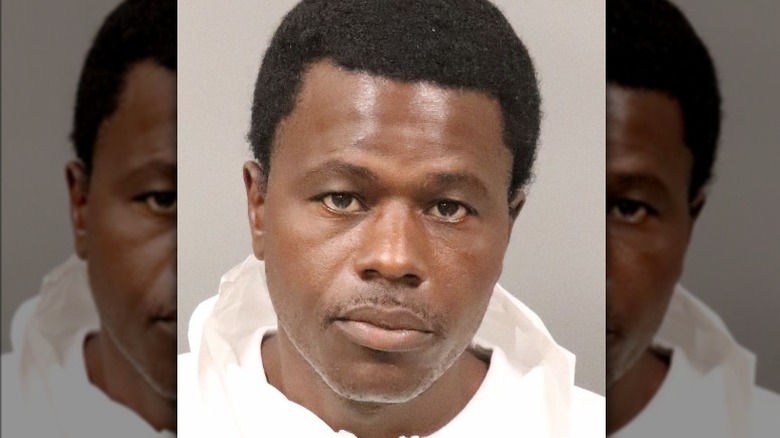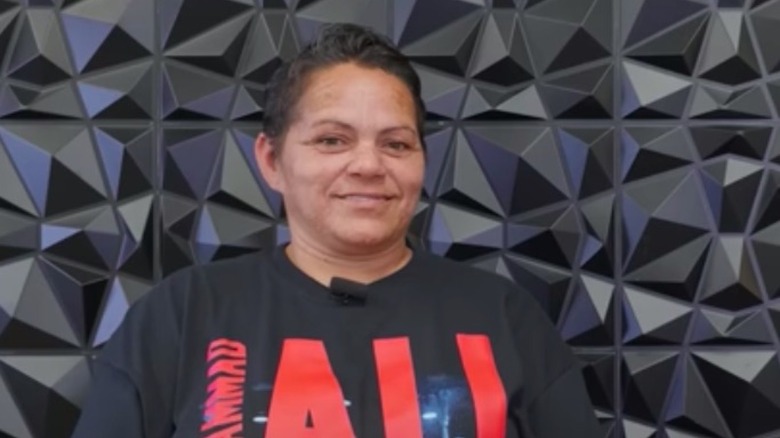The Story Of Natasha LaTour, Who May Be The Only Survivor Of The Suspected Stockton Killer
Natasha LaTour was living as so many people experiencing drug addiction do in the United States — on the streets, trying to scrape together a means to survive. CNN reports that the woman was living on the streets of Stockton, California in April of 2021 when she was nearly murdered by a man police believe is the notorious Stockton Killer. Living on the streets made LaTour an easy target. She was experiencing an addiction to methamphetamine and had recently become homeless. To get money, she was scavenging aluminum cans and selling them back for change.
In an interview with 209 Times (via People), LaTour talked of how she was living in a tent near a set of railroad tracks. Around 3 a.m. one night, a man dressed in a dark hoodie and wearing a face mask approached her with a gun. In her belief, she would need to get as close as possible to the street if she had any chance to survive. Unfortunately, the gunman stood between her and the roadway. As he began to open fire, LaTour was trapped between the side of a building and a moving train. With nowhere to get refuge from the gunfire, she made the quick decision to charge forward, moving toward the gunman. The bullets tore into her body, tearing into her flesh with searing hot flashes.
If you or anyone you know needs help with addiction issues, help is available. Visit the Substance Abuse and Mental Health Services Administration website or contact SAMHSA's National Helpline at 1-800-662-HELP (4357).
Her quick thinking might have saved her life
After being shot as many as 10 times, Natasha LaTour collapsed and was left for dead near the street (via People). The man who fired nearly a dozen bullets into her fled, leaving her to die. But her determination — and a little bit of luck — staved off death that night. According to CNN, the severely wounded woman was able to scoot 60 feet on her back so that she was in plain sight on the street. LaTour told 209 Times that the people inside a passing vehicle saw her lying there and stopped. She heard a man say, "I'm right here. I'm calling 911 for you, mija, don't worry."
Minutes later, an ambulance arrived. LaTour remembers parts of her ride to the hospital but eventually lost consciousness. She awoke days later in recovery, still reeling from the multiple injuries she sustained in the shooting. A week later, she was discharged and became determined to get sober and get her life back on track.
She says police did little to help bring her shooter to justice
Natasha LaTour's injuries were substantial and impacted several vital organs. CNN reports that the woman would take months to recover from the serious injuries she sustained that evening. Her liver and a lung had been impacted, with bullets also doing damage to her collarbone and shoulder. The hail of gunfire also did nerve damage.
To make matters worse, LaTour doesn't believe that the case was properly handled by Stockton police. According to her, the "only statement they ever took was when I was dying in the middle of the street." She is under the impression that the police may have thought that the crime against her was nothing more than a botched drug deal and made investigating it a low priority. After getting no visits from the police while she was in the hospital, LaTour was able to make contact with an investigator several weeks after her release. It was then that she was told that the weapon that nearly killed her matched one used in the shooting death of a man just days before her brush with death.
In LaTour's opinion, at least five innocent lives could have been saved had the police reacted with due diligence. More than a year later, police were desperately searching for a suspect that they believed killed half a dozen men. The description they released to the public matched the one that LaTour gave to police after she was shot.
Police nab the suspected Stockton Killer
CNN reports that police used tips from the public to identify a man named Wesley Brownlee as their prime suspect. The outlet reports that police had placed Brownlee under surveillance and apprehended him early one morning in October 2022. The team noticed that their suspect was dressed in dark clothing "with a mask around his neck," matching the description of the killer. He was also carrying a handgun. In a statement to the press, Stockton Police Chief Stanley McFadden stated that Brownlee's dress and behavior convinced him that the suspect "was on a mission to kill. He was out hunting. We are sure we stopped another killing." With the evidence they already had, prosecutors were able to file three murder charges against Brownlee with hopes of more to come.
The police are still investigating the suspect's motive to kill, but believe that he established a pattern. They believe that Brownlee targeted people who were able to be caught off guard. He preyed on those who were alone and in areas where there weren't surveillance cameras or the potential for good eyewitnesses. He attacked late at night and preferred to work in the darkest areas. His victims were made up of people who were housed as well as a few who were not.
Brownlee has been charged with seven murders
In late December 2022, prosecutors charged Wesley Brownlee with four additional counts of murder (per the New York Post). They allege that Brownlee began to kill in early April 2021, beginning with the murders of Juan Vasquez Serrano and Mervin Harmon in nearby Alameda County. After the attack on LaTour that same month, Brownlee ceased killing for a year before allegedly killing Salvador Debudey Jr. on April 11, 2022.
LaTour is convinced that police knew early on that there was a serial killer at large in the area. She further maintains that if her case was properly investigated that innocent people would still be alive today. She told CNN that "everybody that died after me didn't have to." Police have not commented on LaTour's allegations, pointing out that they are limited to what can be said while the cases against Brownlee are still pending in court. But Joe Silva, who serves as the Stockton police department's public information officer, did say that both he and Chief Stanley McFadden made official apologies to LaTour for the department not following up on her case. They also noted that the investigator assigned to handle LaTour's case had been removed and was no longer with the department.
A crime victim's desire to help others in need
Even though Natasha LaTour was staring in the face of death that night, she decided to forgive the man who police suspect tried to kill her. When asked by CNN about how she was able to find grace for someone who shot her repeatedly, she responded, "I'm not saying you should trust me in a room with him. I have tried to hate him. God won't let me."
LaTour doesn't seem to be letting her near-death experience stop her from moving forward and even wants to use the experience to help others. She also revealed that she is more upset about the aftermath of the shooting than she is about the shooting itself. Because of this feeling, LaTour expressed a desire to become a victim advocate. In her belief, a crime victim should have better access to health care after a violent attack, especially mental health treatment. She also has a strong belief that crime victims should have accurate and timely updates on their cases and wants to push for better communication between law enforcement officials and those that they are sworn to protect.
LaTour cites her newly found faith in God as the force that guides her to not only stay sober but also do the most good she can. "I am honored God is using me for whatever His higher power is. God is dope. Seriously, He's the best," she told CNN.





